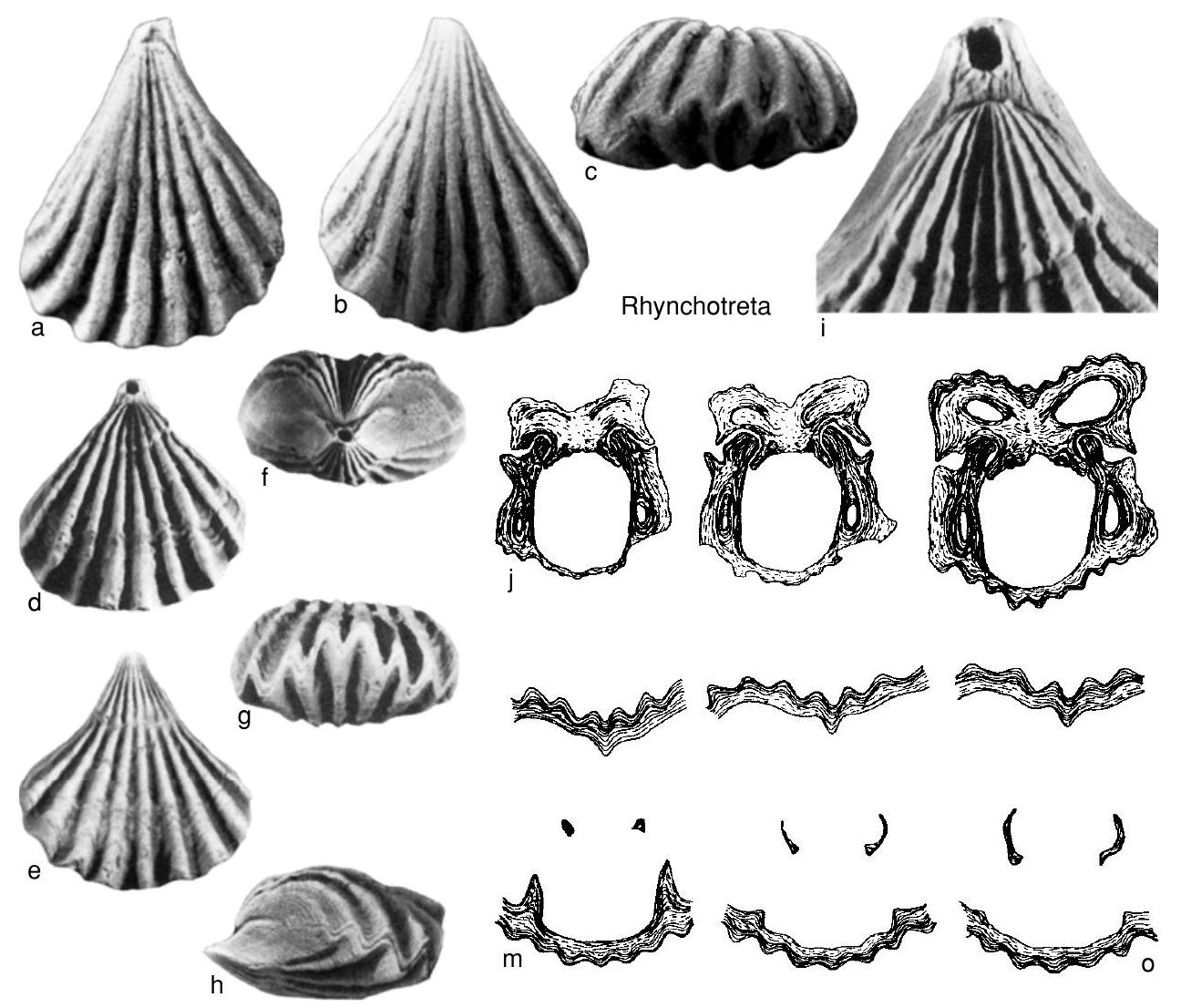Welcome to the Treatise on Invertebrate Paleontology!
Please enter a genera name to retrieve more information.

Rhynchotreta
Classification
Phylum:
Brachiopoda
Subphylum:
Rhynchonelliformea
Class:
Rhynchonellata
Order:
Rhynchonellida
Superfamily:
Rhynchotrematoidea
Family:
Trigonirhynchiidae
Subfamily:
Virginiatinae
Formal Genus Name and Reference:
Rhynchotreta HALL, 1879, p. 166
Type Species:
Terebratula cuneata DALMAN, 1828, p. 141, OD
Images
(Click to enlarge in a new window)
Fig. 727ao. * R. cuneata (DALMAN), upper Wenlock-lower Ludlow, a-c, lectotype, dorsal, ventral, and anterior views, Klinteberg Beds, Klinteberg, Gotland, x3 (Bassett & Cocks, 1974), d-h, hypotype, dorsal, ventral, posterior, anterior, and lateral views, Klinteberg Beds, Bryten, near Klinte, Gotland, x2.5, i, enlargement of delthyrial area showing deltidial plates, x8.3, j-o, hypotype, serial sections 1.6, 1.8, 2.2, 2.9, 3.4, 3.5 ~mm from posterior, Klinteberg Beds, Bryten, near Klinte, Gotland, x8.3 (Jin & Caldwell, 1990).
Synonyms
Bailongjiangella
Geographic Distribution
Europe, Urals, Altai, China, North America
Age Range
Beginning Stage in Treatise Usage:
lower Silurian (Llandovery)
Beginning International Stage:
Rhuddanian
Fraction Up In Beginning Stage:
0
Beginning Date:
443.07
Ending Stage in Treatise Usage:
upper Silurian (Ludlow)
Ending International Stage:
Ludfordian
Fraction Up In Ending Stage:
100
Ending Date:
422.73
Description
Small, elongate triangular outline, apical angle acute, biconvex. Beak straight to suberect, ventral interarea long, delthyrium long with circular foramen bounded anteriorly by conjunct to disjunct deltidial plates. Fold and sulcus weak, anterior commissure uniplicate, serrate. Costae strong, rounded, simple, usually from beaks. Dental plates well developed, close to valve walls, vertical, teeth stout. Dorsal median septum short, low, thick, septalium without cover, cardinal process absent, crural bases subtriangular, crura long, laterally compressed, concave medially in section. Lower Silurian (Llandovery)-upper Silurian (Ludlow): Europe, Urals, Altai, China, North America.
References
Museum or Author Information
Classification
Phylum:
Brachiopoda
Subphylum:
Rhynchonelliformea
Class:
Rhynchonellata
Order:
Rhynchonellida
Superfamily:
Rhynchotrematoidea
Family:
Trigonirhynchiidae
Subfamily:
Virginiatinae
Formal Genus Name and Reference:
Rhynchotreta HALL, 1879, p. 166
Type Species:
Terebratula cuneata DALMAN, 1828, p. 141, OD
Images
(Click to enlarge in a new window)
Fig. 727ao. * R. cuneata (DALMAN), upper Wenlock-lower Ludlow, a-c, lectotype, dorsal, ventral, and anterior views, Klinteberg Beds, Klinteberg, Gotland, x3 (Bassett & Cocks, 1974), d-h, hypotype, dorsal, ventral, posterior, anterior, and lateral views, Klinteberg Beds, Bryten, near Klinte, Gotland, x2.5, i, enlargement of delthyrial area showing deltidial plates, x8.3, j-o, hypotype, serial sections 1.6, 1.8, 2.2, 2.9, 3.4, 3.5 ~mm from posterior, Klinteberg Beds, Bryten, near Klinte, Gotland, x8.3 (Jin & Caldwell, 1990).
Synonyms
Bailongjiangella
Geographic Distribution
Europe, Urals, Altai, China, North America
Age Range
Beginning Stage in Treatise Usage:
lower Silurian (Llandovery)
Beginning International Stage:
Rhuddanian
Fraction Up In Beginning Stage:
0
Beginning Date:
443.07
Ending Stage in Treatise Usage:
upper Silurian (Ludlow)
Ending International Stage:
Ludfordian
Fraction Up In Ending Stage:
100
Ending Date:
422.73
Description
Small, elongate triangular outline, apical angle acute, biconvex. Beak straight to suberect, ventral interarea long, delthyrium long with circular foramen bounded anteriorly by conjunct to disjunct deltidial plates. Fold and sulcus weak, anterior commissure uniplicate, serrate. Costae strong, rounded, simple, usually from beaks. Dental plates well developed, close to valve walls, vertical, teeth stout. Dorsal median septum short, low, thick, septalium without cover, cardinal process absent, crural bases subtriangular, crura long, laterally compressed, concave medially in section. Lower Silurian (Llandovery)-upper Silurian (Ludlow): Europe, Urals, Altai, China, North America.
